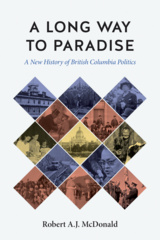
“Why don’t they just move?” This reductive question is asked whenever reports surface of the all-too-common lack of social services and economic opportunities in Canada’s rural and urban communities. But why are certain people and places vulnerable? Who is responsible for remedying the situation? And what is fair?
From the 1950s to the 1970s, the Canadian government relocated people, often against their will, in order to improve their lives. Moved by the State offers a completely new interpretation of this undertaking, seeing it as part of a larger project of economic development and poverty alleviation. This finely crafted history therefore focuses on the bureaucrats and academics who designed, implemented, and monitored the forced relocations, rather than on the experience of those who were uprooted.
Tina Loo explores the contradiction between intention and consequence as resettlement played out among Inuit in the central Arctic, fishing families in Newfoundland’s outports, farmers and loggers in Quebec’s Gaspé region, Black residents of Halifax’s Africville, and Chinese Canadians in Vancouver’s East Side. In the process, she reveals the optimistic belief underpinning postwar relocations: the power of the interventionist state to do good.
This book invites the attention of scholars and students of Canadian social and political history, and will also appeal to general readers interested in postwar Canada, the welfare state, and community, regional, and international development.
Awards
- 2020, Shortlisted - Best Scholarly Book in Canadian History, Canadian Historical Association
- 2020, Shortlisted - J.W. Dafoe Book Prize, J.W. Dafoe Foundation
- 2020, Winner - Best Book in Political History, Canadian Historical Association
…the book is thought-provoking and will inspire discussion among those looking to Canadian social and political challenges of the past, as well as those considering them in the future.
Moved by the State illuminates a moment in Canadian history when bureaucrats, politicians, and university ‘experts’ – imbued with hope and a belief in the interventionist state – planned the forcible relocation of individuals from their communities in order to help them share in ‘the good life.’ It is meticulously researched, theoretically informed, and convincingly argued.
Tina Loo is a masterful scholar and in Moved by the State she offers a completely new interpretation of resettlements of the 1950s and ’60s as understood through the lens of high modernism. The result is both revisionist and refreshing.
Introduction
1 “No More Canadians Will Starve!”: Development, Discipline, and Decolonizing the North
2 “The Governmentality Game”: Problematizing, Resettling, and Democratizing Newfoundland
3 “Artisans of Their Destiny”: Participation, Power, and Place in Quebec’s Backcountry
4 “Deviating from the Strict Letter of the Law”: Race, Poverty, and Planning in Postwar Halifax
5 “A Fourth Level of Government”? Urban Renewal, State Power, and Democracy in Vancouver’s East Side
Conclusion
Notes; Bibliography; Index











